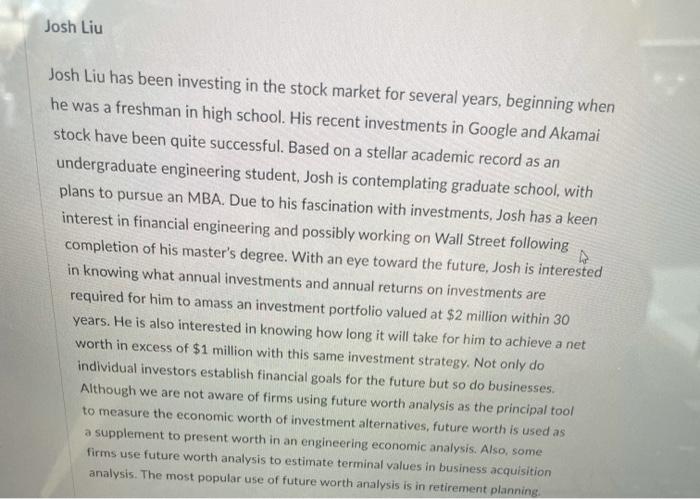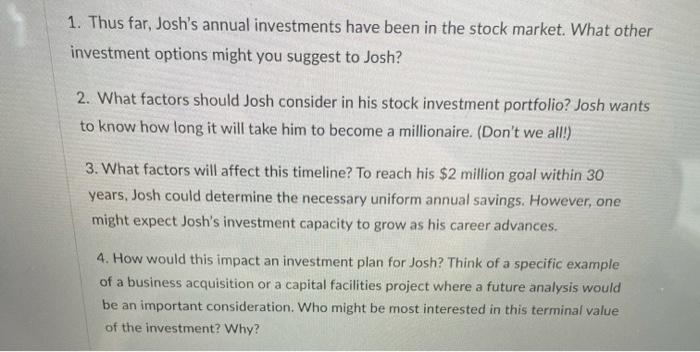Josh Liu Josh Liu has been investing in the stock market for several years, beginning when he was a freshman in high school. His recent investments in Google and Akamai stock have been quite successful. Based on a stellar academic record as an undergraduate engineering student, Josh is contemplating graduate school, with plans to pursue an MBA. Due to his fascination with investments, Josh has a keen interest in financial engineering and possibly working on Wall Street following completion of his master's degree. With an eye toward the future, Josh is interested in knowing what annual investments and annual returns on investments are required for him to amass an investment portfolio valued at $2 million within 30 years. He is also interested in knowing how long it will take for him to achieve a net worth in excess of $1 million with this same investment strategy. Not only do individual investors establish financial goals for the future but so do businesses. Although we are not aware of firms using future worth analysis as the principal tool to measure the economic worth of investment alternatives, future worth is used as a supplement to present worth in an engineering economic analysis. Also, some firms use future worth analysis to estimate terminal values in business acquisition analysis. The most popular use of future worth analysis is in retirement planning 1. Thus far, Josh's annual investments have been in the stock market. What other investment options might you suggest to Josh? 2. What factors should Josh consider in his stock investment portfolio? Josh wants to know how long it will take him to become a millionaire. (Don't we all!) 3. What factors will affect this timeline? To reach his $2 million goal within 30 years, Josh could determine the necessary uniform annual savings. However, one might expect Josh's investment capacity to grow as his career advances. 4. How would this impact an investment plan for Josh? Think of a specific example of a business acquisition or a capital facilities project where a future analysis would be an important consideration. Who might be most interested in this terminal value of the investment? Why? Josh Liu Josh Liu has been investing in the stock market for several years, beginning when he was a freshman in high school. His recent investments in Google and Akamai stock have been quite successful. Based on a stellar academic record as an undergraduate engineering student, Josh is contemplating graduate school, with plans to pursue an MBA. Due to his fascination with investments, Josh has a keen interest in financial engineering and possibly working on Wall Street following completion of his master's degree. With an eye toward the future, Josh is interested in knowing what annual investments and annual returns on investments are required for him to amass an investment portfolio valued at $2 million within 30 years. He is also interested in knowing how long it will take for him to achieve a net worth in excess of $1 million with this same investment strategy. Not only do individual investors establish financial goals for the future but so do businesses. Although we are not aware of firms using future worth analysis as the principal tool to measure the economic worth of investment alternatives, future worth is used as a supplement to present worth in an engineering economic analysis. Also, some firms use future worth analysis to estimate terminal values in business acquisition analysis. The most popular use of future worth analysis is in retirement planning 1. Thus far, Josh's annual investments have been in the stock market. What other investment options might you suggest to Josh? 2. What factors should Josh consider in his stock investment portfolio? Josh wants to know how long it will take him to become a millionaire. (Don't we all!) 3. What factors will affect this timeline? To reach his $2 million goal within 30 years, Josh could determine the necessary uniform annual savings. However, one might expect Josh's investment capacity to grow as his career advances. 4. How would this impact an investment plan for Josh? Think of a specific example of a business acquisition or a capital facilities project where a future analysis would be an important consideration. Who might be most interested in this terminal value of the investment? Why








